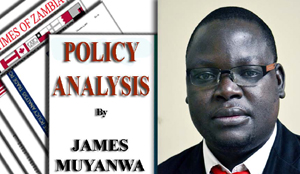 Yes a lot has taken place since my last article and I will try to delve a few of them before going to the main issue.
Yes a lot has taken place since my last article and I will try to delve a few of them before going to the main issue.
Coming barely a week after Finance Minister Alexander Chikwanda unveiled the 2016 National Budget to the nation through Parliament the week was overloaded.
From the National Budget itself, there is still a lot of issues which are begging for attention while the launch of the first-ever Credit Rating Agency (CRA) in Zambia provided some news peg.
The CRA was launched last Wednesday and obviously there could be need to, one of these fine days, look at the issue into details.
Equally important were issues which emanated from the Zambia National Farmers Union (ZNFU), among them, the presentation from Zesco on the current power situation in the country and the future outlook.
From our own coverage, we have a raging issue of Mansa Batteries which is about to be transformed into a shopping mall and has raised some concerns among some stakeholders.
The climax of the highlight for the week was on Sunday during the national day of prayers at which Zambians from a cross section of society stood in the gap to pray for the economy and other things in the country.
Before that, Commerce, Trade and Industry Minister Margaret Mwanakatwe had added her item of highlight when she said that there was need for Zambia to set 12 per cent as the Gross Domestic Product (GDP) growth rate to reduce poverty.
Coming less than a week after Mr Chikwanda had announced the 2016 Budget, projecting a GDP growth rate of five per cent, Ms Mwanakatwe’s statement was rather unfortunate and I hope one day I can justify my point.
Generally, the 2016 National Budget should have been the most difficult Budget for Mr Chikwanda and his team at the ministry to formulate.
This is because – like I said a fortnight ago – it was devised against a myriad of economic challenges in the country, compounded by the high expectations from the stakeholders in various circles.
Yes, the expectations, some of them unreasonable, added to the difficulties Mr Chikwanda and his technocrats must have faced.
It is, however, commendable that the minister chose to be real and faced the realities head one, instead of trying to appease one group of citizens (or stakeholders) or the other.
Like what I stated two weeks ago, which Mr Chikwanda alluded to, the biggest difficulty for the team was the balancing act.
Given the dicey situation as it was, he could have gone for a populist Budget for the workers, for instance, whom he could have lavished with hefty tax benefits by raising the pay as your earn (PAYE) threshold.
This could, however, only have been at the expense of another category of tax players, perhaps the mining investors.
Paradoxically, all taxpayers anticipate reduced taxes for their categories whenever a minister of finance announces the Budget.
It is not surprising that the mining investors, for instance, whom some stakeholders say have not been paying profit-reflective taxes for some time now, were hoping for a reversion to the 2014 mining tax regime by the Government.
If that had been done, it would have meant further loss of revenue for Government which already lost more than K2 billion as the result of adjusting the tax regime from the second half of this year.
Equally, adjusting the PAYE tax band and threshold could have led the Government to foregoing more revenues from the nearly K8 billion which is expected from that tax in 2016.
Therefore, the ministry, seemingly, chose to leave most of the measures as they were.
The minister did this by continuing with the infrastructural development; maintained similar levels of funding towards the general public service and continued with servicing of domestic and external debts.
The effects of the tax relief given for alternative energy sources projects, property transfer tax on land as well as the reduction in excise duty on clear beer are not fatal.
Mr Chikwanda chose to plant some diversification seed by foregoing the revenue from some areas and, therefore, in the long term the measure is progressive.
In an election year that 2016 is, Mr Chikwanda could have been tempted to come up with some allocations aimed at merely endearing the ruling party to some electorate but he resisted that.
He seemingly elected to separate economics from politics by allocating more resources of more than K13 billion or 25 per cent of the total Budget towards the economic sector.
The Government’s augmented task was to truly balance on the need to collect enough taxes without financially strangulating the taxpayers.
On another hand, the expenditures should not be wasteful ones but be economically sensible enough to later yield greater benefit for the nation.
One of the prominent allocations is the proposed expenditure of K6.6 billion earmarked for the road works.
Other allocations are towards the Kenneth Kaunda International Airport, irrigation projects, agriculture, fisheries, citizens’ economic empowerment and the rural electrification exercise.
While – in more aspects than one – the 2016 Budget looks like the 2015’s in terms of taxes and tax benefits, its economic impact on the country will be different.
-For comments call: 0977 246099, 0955 431442 or e-mail: jmuyanwa@gmail.com






